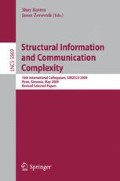Abstract
A population protocol is one of distributed computing models for passively-mobile systems, where a number of agents change their states by pairwise interactions between two agents. In this paper, we investigate the solvability of the self-stabilizing leader election in population protocols without any kind of oracles. We identify the necessary and sufficient condition to solve the self-stabilizing leader election in population protocols from the aspects of local memory complexity and fairness assumptions. This paper shows that under the assumption of global fairness, no protocol using only n − 1 states can solve the self-stabilizing leader election in complete interaction graphs, where n is the number of agents in the system. To prove this impossibility, we introduce a novel proof technique, called closed-set argument. In addition, we propose a self-stabilizing leader election protocol using n states that works even under the unfairness assumption. This protocol requires the exact knowledge about the number of agents in the system. We also show that such knowledge is necessary to construct any self-stabilizing leader election protocol.
This work is supported in part by the Japan Society for the Promotion of Science: Grant-in-Aid for Young Scientists(B)(19700058), the Japan Society for the Promotion of Science: Grant-in-Aid for Scientific Research(C)(21500013) and Hori Information Science Promotion Foundation.
Access this chapter
Tax calculation will be finalised at checkout
Purchases are for personal use only
Preview
Unable to display preview. Download preview PDF.
References
Angluin, D., Aspnes, J., Diamadi, Z., Fischer, M.J., Peralta, R.: Computation in networks of passively mobile finite-state sensors. Distributed Computing 18(4), 235–253 (2006)
Angluin, D., Aspnes, J., Fischer, M.J., Jiang, H.: Self-stabilizing population protocols. In: Anderson, J.H., Prencipe, G., Wattenhofer, R. (eds.) OPODIS 2005. LNCS, vol. 3974, pp. 103–117. Springer, Heidelberg (2006)
Angluin, D., Aspnes, J., Chan, M., Fischer, M.J., Jiang, H., Peralta, R.: Stably computable properties of network graphs. In: Prasanna, V.K., Iyengar, S.S., Spirakis, P.G., Welsh, M. (eds.) DCOSS 2005. LNCS, vol. 3560, pp. 63–74. Springer, Heidelberg (2005)
Angluin, D., Aspnes, J., Eisenstat, D.: Stably computable predicates are semilinear. In: Proc. 25th Annual ACM Symposium on Principles of Distributed Computing, pp. 292–299 (2006)
Angluin, D., Aspnes, J., Eisenstat, D.: A simple protocol for fast robust approximate majority. In: Pelc, A. (ed.) DISC 2007. LNCS, vol. 4731, pp. 20–32. Springer, Heidelberg (2007)
Angluin, D., Aspnes, J., Eisenstat, D., Ruppert, E.: The computational power of population protocols. Distributed Computing 20(4), 279–304 (2007)
Aspnes, J., Ruppert, E.: An introduction to population protocols. Bulletin of the EATCS 93, 98–117 (2007)
Beauquier, J., Clement, J., Messika, S., Rosaz, L., Rozoy, B.: Self-stabilizing counting in mobil sensor networks. In: Pelc, A. (ed.) DISC 2007. LNCS, vol. 4731, pp. 63–76. Springer, Heidelberg (2007)
Canepa, D., Potop-Butucaru, M.G.: Stabilizing leader election in population protocols (2007) (unpublished)
Delporte-Gallet, C., Fauconnier, H., Guerraoui, R., Ruppert, E.: When birds die: Making population protocols fault-tolerant. In: Gibbons, P.B., Abdelzaher, T., Aspnes, J., Rao, R. (eds.) DCOSS 2006. LNCS, vol. 4026, pp. 51–66. Springer, Heidelberg (2006)
Fischer, M.J., Jiang, H.: Self-stabilizing leader election in networks of finite-state anonymous agent. In: Shvartsman, M.M.A.A. (ed.) OPODIS 2006. LNCS, vol. 4305, pp. 395–409. Springer, Heidelberg (2006)
Author information
Authors and Affiliations
Editor information
Editors and Affiliations
Rights and permissions
Copyright information
© 2010 Springer-Verlag Berlin Heidelberg
About this paper
Cite this paper
Cai, S., Izumi, T., Wada, K. (2010). Space Complexity of Self-stabilizing Leader Election in Passively-Mobile Anonymous Agents. In: Kutten, S., Žerovnik, J. (eds) Structural Information and Communication Complexity. SIROCCO 2009. Lecture Notes in Computer Science, vol 5869. Springer, Berlin, Heidelberg. https://doi.org/10.1007/978-3-642-11476-2_10
Download citation
DOI: https://doi.org/10.1007/978-3-642-11476-2_10
Publisher Name: Springer, Berlin, Heidelberg
Print ISBN: 978-3-642-11475-5
Online ISBN: 978-3-642-11476-2
eBook Packages: Computer ScienceComputer Science (R0)

